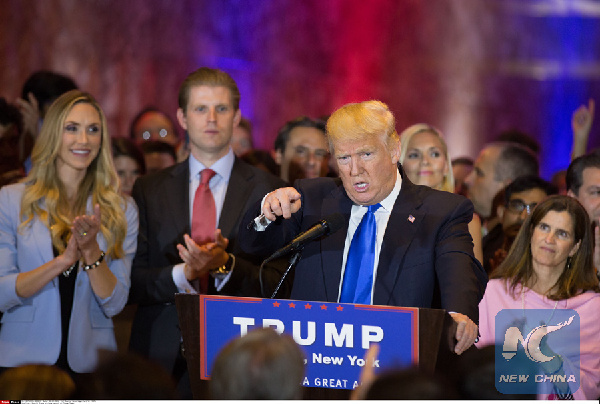Who's afraid of Mr. Trump?
- By Tim Collard
 0 Comment(s)
0 Comment(s) Print
Print E-mail China.org.cn, May 10, 2016
E-mail China.org.cn, May 10, 2016
|
|
|
U.S. Republican presidential front-runner Donald Trump. (Xinhua) |
It is one of China's fundamental principles of international relations not to interfere in, or make tendentious comments on, the internal affairs of other states. But, although this principle is being upheld in the case of the 2016 American presidential elections, the identity of the next American president, and the likely course of international policies he (or she!) might pursue, is of course of huge interest to the world's other major players, and to China in particular.
Generally speaking, worries about sharp changes of course following a change of president have proved unnecessary. An election campaign generates a great deal of talk, aimed at making a powerful impression on the public and thus securing their votes; but, once the campaign is over and the responsibilities of office have been assumed, more cautious counsels tend to prevail.
Nonetheless, the current campaign has given rise to suggestions that it may be different this time. Donald Trump appears to have clinched the Republican nomination for November's election. As a businessman and financier rather than a career politician, he has the most unusual background for an aspiring president since former actor Ronald Reagan. And not only is Mr. Trump not a conventional politician - he also owes his electoral success to standing as the "anti-politics" candidate, rejecting all the temporizing and lack of boldness which characterize the political establishment. To put it simply, Trump wants to be different - in some ways, revolutionary - in his approach. What might the implications of this be for the rest of the world?
Firstly, China. China has become accustomed to a degree of China-bashing during U.S. election campaigns. Candidates will always be tempted to flaunt their patriotism by promising to exalt the USA above her political and commercial rivals, with China figuring prominently in both categories. However, following the election, the "rivals" usually become partners again.
But some of the things Trump has been saying have elicited disquiet, even among normally phlegmatic Chinese commentators. Trump has described Chinese bilateral trading practices as akin to "rape" and has suggested a 45 percent tariff on Chinese imports. A Chinese Foreign Ministry spokesperson has warned of a potential "major upheaval" in U.S.-China relations; while being careful to stick firmly to the principle of non-interference, the spokesperson expressed a hope that the next U.S. administration would view relations between the world's two largest economies "rationally and objectively." Trump has also promised to somehow stop China's island-building program in the South China Sea, which can also be interpreted as evidence of aggressive intent.
Another potentially disruptive issue raised by Trump involves the international debt issue. Referring to America's colossal levels of debt, Trump has made some play with his experience of making complex financial deals. Trump has denied any intention of changing unilaterally or renegotiating the terms on which U.S. bonds are serviced, which would threaten to strike at the heart of the entire global financial system. But he has spoken of the possibility of refinancing some U.S. sovereign debt at lower interest rates over a longer duration. Any questioning of the U.S.'s willingness to service her sovereign debt under the agreed terms must be of concern to the whole world, and will particularly concern China, the U.S.'s biggest creditor.
But the "Trump program" also contains elements which may be more agreeable to China. While Trump proposes to maintain America's global strength and has shown no intention to withdraw from the U.S.'s network of alliances in East Asia, he has expressed discontent over the costs to the American exchequer and has said that America's allies should bear a larger part of the burden. This does not necessarily imply any weakening of commitment to the Asian alliance structure, but it strongly suggests that a Trump administration will not issue a blank cheque to its Asian allies to fund irresponsible adventurism aimed against Chinese interests. On the economic front, Trump has not made it clear to what extent he would press for full implementation of the TPP program. Trump represents several strands of U.S. political thought in his somewhat eclectic political platform, and one of those strands is isolationism.
To sum up, it must be remembered that we are still in the most turbulent stage of the U.S. electoral process. The expression of extreme views can be necessary in the hunt for a party nomination, whereas the actual election requires a strategy to capture more moderate voters, and an elected president will need to act carefully. It can, I think, be safely assumed that the more radical comments made by Donald Trump (and by his rivals) are made for domestic consumption only and need not cause undue concern in the global sphere.
The writer is a columnist with China.org.cn. For more information please visit:
http://www.china.org.cn/opinion/timcollard.htm
Opinion articles reflect the views of their authors, not necessarily those of China.org.cn.







Go to Forum >>0 Comment(s)